Ecumenism/church unity, interfaith
The NCCK sincerely acknowledges the reality of the vast diversity of church denominations and sub-denominations in Korea. With this in mind, the NCCK works for church unity in such areas as mission, theology, and church service, particularly encouraging exchanges between theologians and seminary students of different denominations. The NCCK annually observes the Week of Prayer for Christian Unity together with the Korean Orthodox Church and the Catholic Church every January.
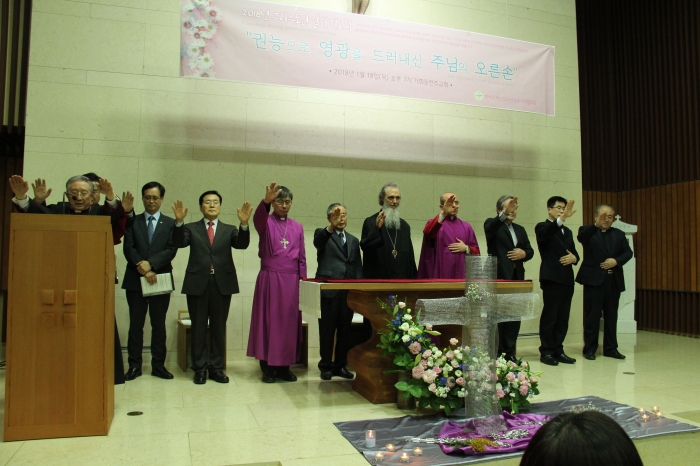
Peace and reunification in Korea
“We the churches of Korea believe that all Christians have now been called to work as apostles of peace (Colossians 3:15); that we are commanded by God to overcome today's reality of confrontation between our divided people - who share the same blood but who are separated into south and north; and that our mission task is to work for the realization of unification and peace (Matthew 5:23-24).”
- Declaration of the Churches of Korea on National Reunification and Peace, 1988
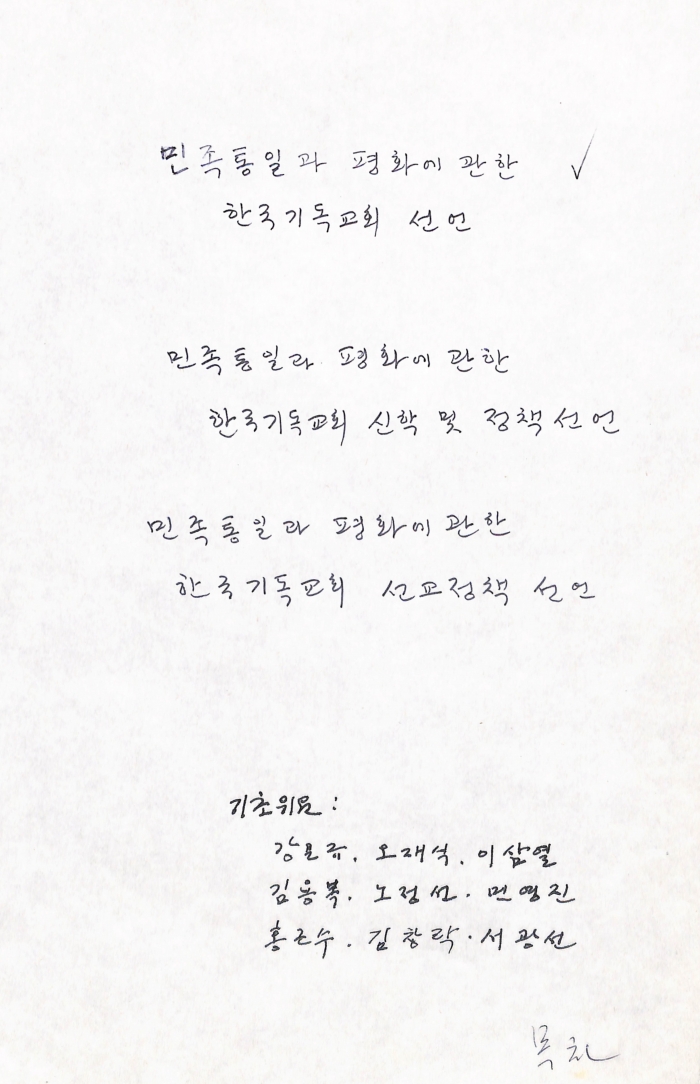
The separation between North and South Korea is recognized by the global community as the only remaining case of national division in the world. Overcoming this division has been one of the most pressing historical agendas for the churches of Korea. In 1982, the NCCK professed that peaceful reunification was to be a mission task of the Korean Church, and the WCC and world partner churches have joined them in this task. Since 1988, the NCCK and the Korean Christian Federation (KCF), the NCCK’s North Korean counterpart, have been jointly observing annual common prayer Sundays. The NCCK has been working on exchanges and cooperation with the KCF to mutually share resources with our sisters and brothers in North Korea. The NCCK took up the reins of a global campaign for a Korean peace treaty in 2013 in cooperation with the WCC, and in 2019 it merged this campaign with the Korea Peace Appeal alongside numerous Korean NGOs and global peace networks seeking to end the ongoing Korean War.
World churches, solidarity
From its early years, the NCCK focused on exchanges with churches around the world, sending delegates to the first General Assembly of the WCC. Particularly after the Korean War, the world churches worked diligently to restore the Korean Church and society and have affected a deep concern for, and sincere cooperation with, Korean churches through supporting the human rights movement and the democracy movement during the period of the Yushin Dictatorship Constitution in the 70s, and the peaceful reunification movement in the 80s.
The NCCK seeks to build and strengthen solidarity with world ecumenical organizations including the WCC and the CCA, and world partner churches in the US, Japan, Germany, Canada, Australia, the Philippines, China, and Russia, and many other countries through organizing joint conferences and exchange programs.
Justice and peace (Church and society, human rights)
The NCCK works to achieve God’s justice and peace and the integrity of creation in areas of political, economic and social issues to fulfill its social mandate as God’s Church. Among many issues related to these areas the NCCK especially focuses on human rights violations against marginalized people by unjust powers, issues of poverty and marginalization caused by neoliberalism, the destruction of the environment, and seeks to understand the perspectives of the LGBTQ+ community along with issues surrounding sexual minorities in order to build God’s beloved community on earth.
Organized in 1974, the NCCK Human Rights Committee has played a leading role in advocating issues of human rights, democratization, economic justice, and overcoming violence throughout Korean society. This committee created the Human Rights Center as a special task force to address the human rights of all people in Korea and to facilitate solidarity with other peoples in Asia. Eventually the Human Rights Committee was reorganized as the Justice and Peace Committee, and the Human Rights Center continued its work while also working more independently. Nonetheless the now Justice and Peace Committee continues to relate closely with the Human Rights Center as their work often overlaps on efforts such as presenting faith standpoints on social issues, holding services on Human Rights Sunday, awarding human rights prizes, working to improve the rights of Koreans living in Japan, holding prayer meetings on behalf of the suffering and marginalized, participating in the movement for the abolition of capital punishment and supporting prisoners without family or friends.
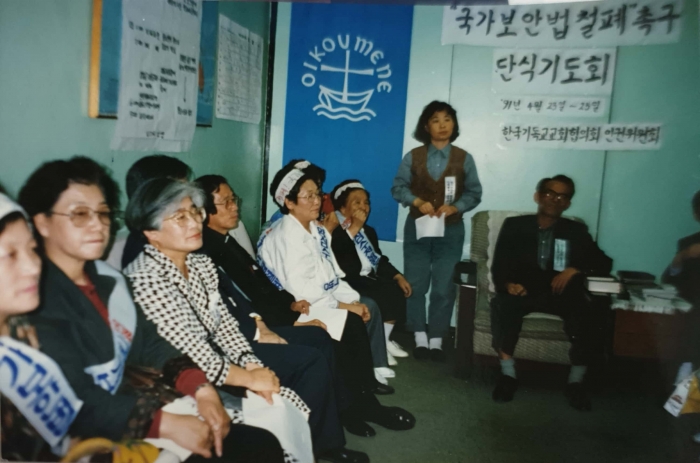
The Life and Culture Committee establishes, educates on and publicizes on behalf of the dignity of life and Christian ethics, and studies and makes measurements about ecological and environmental problems. Holding conferences on environmental policies, holding Environment Sunday services, making environmental booklets, making an environmental rounding service, and holding workshops on caring for life are the main works of the committee with its purpose of harmonizing science and religion. Beginning in 2021 this committee has launched a campaign to address the global climate crisis, “10 Years of Emergency Action for the Climate Crisis”. This campaign will help equip churches and Christian climate groups for operating in a post-COVID-19 society, will facilitate solidarity between churches and climate action groups, increase awareness of and expand participation in climate action, and enhance cooperation with the global Church to realize the 2050 Zero Carbon campaign.
The Life and Culture Committee also works to revitalize Christian culture, and to develop and improve ecumenical spirituality. It encourages the church to positively affirm the culturally creative activities of human beings which God has blessed, and to love and respect the diversity and creativity of culture.
Through the love, Gospel spirit, and ecumenical spirit of Jesus Christ, the Christian Social Service Committee aims to support emergency relief to various underprivileged people at home and abroad and to the socially disadvantaged in need, mid- to long-term disaster recovery projects, social service and social welfare, social development support, social service leader training, and aid for homelessness; and furthermore, the committee seeks to contribute to the development of the ecumenical cooperation projects of Korean Christianity. The committee’s major efforts include 'Ecumenical Diaconia Academy' courses, humanitarian exchange cooperation with North Korea, policy research to revitalize the social economy and social enterprises, disaster relief workshops and training programs, poverty relief works, publishing a collection of Christian Social Movement history, and Diaconian mission sponsorship projects.
Faith and order
The Faith and Order Committee focuses on establishing a theological base for ecumenism and the unity of Korean churches. The committee is trying to find a way to theologize the Korean Church’s ecumenical movement and, by doing so, to contribute to Korean and world theology. The Committee theologically reviews peace and conflict issues inside and outside Korea from diverse angles to broaden and deepen the Korean churches’ theological understanding of peace.
Gender equality
The Committee for Women is concerned about working toward a practice of gender equality in the church through reforming damaged power structures, advocating for the subjectivity of women in the church, and promoting women’s leadership and solidarity. In its second “Decade of Churches in Solidarity with Women” (2001-2010), the Committee worked hard under the theme of “toward a living community of equality and sharing”, to combat discrimination and violence against women in Korea and to make a world of equality and peace. The Committee is working not only with Christian women but also with women from other religions and social organizations as an expression of the Christian women’s movement for peace and unity.
Through participating in diverse initiatives of the Committee, NCCK member denominations recognize their responsibility for discriminatory structures against women in the church and society, and are encouraged to work for the restoration of Christian communities of respect and sharing.
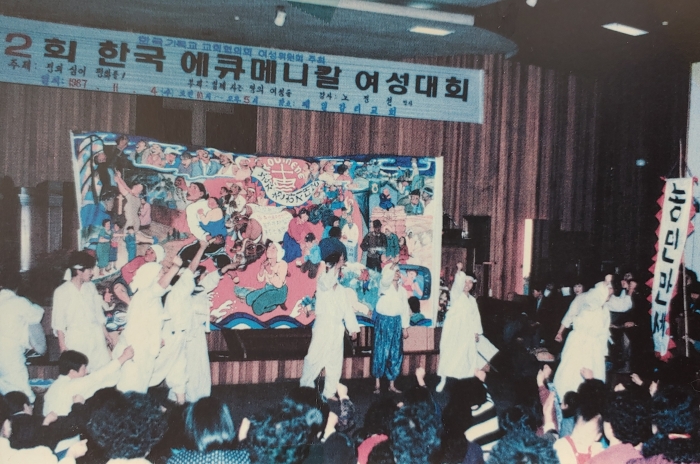
Youth (Young Adult) leadership
NCCK’s work with youth (young adults) is carried out by the Youth Committee in areas of mission work to achieve social justice, such as ecumenism and unity of Christian youth, renewal of the Church, prophetic criticism of social injustice, and support of suffering neighbors. Recognizing the reality of Christian young adults who are often pressured to survive in our highly competitive society, NCCK’s youth work plans and promotes continuous policies to help youth to establish their identities as Christians and to live as Christian youth through practical professions of faith.
The NCCK’s Youth Committee includes participation of NCCK member organizations such as the Korean Student Christian Federation (KSCF), the National YWCA of Korea, and the Korean YMCA. The Committee also works in cooperation with an affiliate organization, the Ecumenical Youth Council in Korea.
Christian Education
The NCCK bolsters Christian education throughout Korea through the Education Committee. The main activities and work of this committee involve laying a foundation for a sustainable ecumenical movement, and to ensure that this movement of ecumenism spreads to the each region of Korea where it will be implemented through actual faith and life. The Education Committee especially seeks to accomplish this last aspect through the Christian Academy Program. The Academy facilitates meetings and lectures throughout Korea in cooperation with other NCCK committees and partner organizations to spread practicable daily church unity, encouraging local churches and Christians to live lives based on justice, peace, reconciliation, and respect for life, as well as becoming healthy members of local civil society and democratic citizens.
The Education Committee also studies the deepening educational inequality in a post-COVID-19 Korea, seeks alternatives, and tries to find what the church can do to address the situation. They also seek to counteract the assumptions that intellectual pursuits should be excluded from Christian or theological conversations, a tendency found in some Korean churches. Instead, the committee strives to cultivate Christians who communicate with the world and society and who include academic and intellectual voices at the table.
Honoring Korean Christian history
The NCCK 100th Anniversary Project Committee was created in 2015 and has been working to prepare for the 100th anniversary of the NCCK in 2024. For this anniversary the Project Committee seeks to honor the legacy which the NCCK set in 1932 when it announced a social creed calling for the protection of human rights for children, women, and workers. In that spirit the NCCK has been struggling on behalf of democracy, human rights, and peace on the Korean Peninsula ever since the period of South Korea’s military dictatorships. The NCCK's 100th anniversary project collects and publishes materials from the Korean Christian Social Movement, and it focuses on publishing history books for the purpose of researching and promoting the contribution of Korean Christianity to the progress of Korean society.
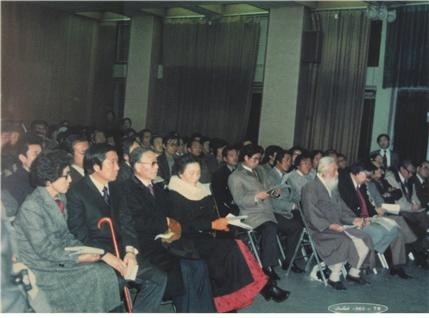
Contact
To get in touch with NCCK, contact our international office via email: ncckintl@kncc.or.kr



